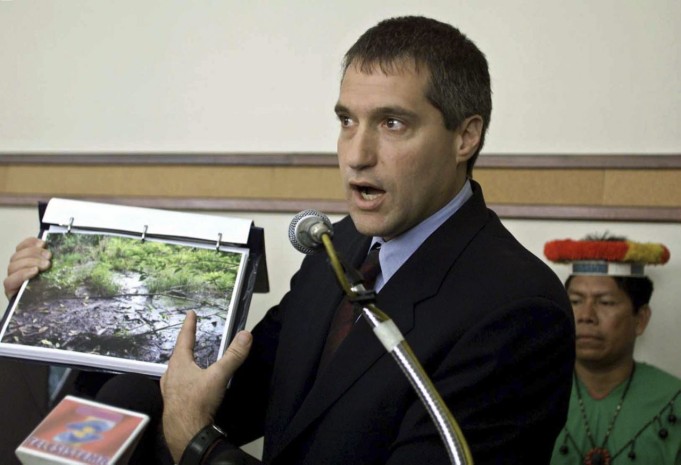
Yahoo Finance 19/05/2017

Attorney Steven Donziger shows pictures of a pool of oil which seeped out from an oil waste pit left behind by Texaco at an oil pump site in the Amazon jungle, in Quito, in this October 30, 2003 file photo. Foto: Yahoo Finance
Time may be running short for New York lawyer Steven Donziger.
Chevron filed a brief this week, urging the U.S. Supreme Court to rebuff Donziger’s petition asking it to overturn a devastating judgment against him and his greatest achievement: a multibillion-dollar verdict in an environmental case he’d been pressing for more than 20 years.
Donziger’s campaign against Chevron reached its high-water mark six years ago, in March 2011, when he and a team of local lawyers won an $18 billion verdict—later reduced to $9.5 billion—in a provincial court in Lago Agrio, Ecuador, on behalf of residents of the Amazon region where Texaco, acquired by Chevron in 2001, had drilled from 1964 to 1992.
The verdict was hailed—and is still hailed in many quarters—as a historic vindication of the claims of Third World peoples, whose land and lives had been befouled by a soulless American corporation."
“We’ve won the case,” says Donziger, 55, in a self-produced video on his website, “but we’re still fighting.” The former journalist, Harvard Law graduate, and public defender continues: “We are facing what I believe is the most vicious, well-funded, corporate retaliation campaign ever—to destroy us.
He’s talking about what happened in February 2011, when Chevron sued Donziger in Manhattan federal court for civil racketeering. Though U.S. District Judge Lewis Kaplan didn’t make a finding about whether the residents of Lago Agrio had been victimized by Texaco, which was outside the scope of the suit, he did conclude that Chevron had been repeatedly victimized by Donziger in both Ecuador and in the United States.
In March 2014, after a seven-week trial, Kaplan issued a 485-page, 1,842-footnote ruling, finding that Donziger and his team had procured the Lago Agrio verdict through an elaborate, multi-year campaign of fraud, bribery, extortion, money laundering, and other offenses, which was largely orchestrated and funded from the United States.
Wrote Kaplan: “Even if Donziger and his clients had a just cause—and the Court expresses no opinion on that—they were not entitled to corrupt the process to achieve their goal. Justice is not served by inflicting injustice. The ends do not justify the means.”
Specifically, Kaplan found, Donziger’s team had directed their Denver-based consultants to ghostwrite a key damages report of an ostensibly neutral, court-appointed expert. When Chevron initiated U.S. litigation to expose this sham, Donziger’s team submitted an affidavit containing “half-truths or worse” to numerous U.S. judges in an effort to cover their tracks, Kaplan continued.
Then, when the truth finally came out, Donzinger’s team pulled off the most audacious stunt of all: They secretly ghostwrote the entire final opinion deciding the case, signed by Ecuadorian judge Nicolás Zambrano, in which Zambrano purported to disregard the ghost-written expert’s report, but reached essentially identical conclusions. Zambrano permitted Donziger’s team to write his ruling, Kaplan found, because the team had promised to pay him $500,000 from moneys eventually recovered from Chevron.
Read more here.
Fuente OriginalNotas relacionadas